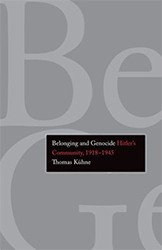“Indispensable” is an overused term in book reviews, but Timothy Snyder’s analysis of the political, social, intellectual, and historical circumstances that gave rise to and even nourished Hitler’s brilliant madness is truly that. The parallels he draws between conditions in Europe in the 1930s and 1940s and those found today in many parts of the world — most notably in Africa — cannot be observed without the recognition that the breeding grounds for rationalized mass murder are still present in our world today.
Snyder’s observations are based on the premise that statelessness is the prologue and necessary condition for genocide. Not only are stateless people the most vulnerable, but the territories they inhabit fall subject to structures in which established legal and political institutions no longer exist to protect its citizens — especially its minorities — and citizenship is no longer a stable reality.
Hitler, with his conception of a “natural” order based on racial might and tested by warfare, used his military and political power to undermine surrounding states before herding Jews into those shadowy places to execute the Final Solution. On too many occasions, Hitler benefited from the fact that the Soviets had done the preliminary work for him, and exploiting the anarchy in their wake made it possible for those wearing the right uniforms to take whatever they wanted to take from the stateless lands. The motive of Lebensraum was not merely, as promoted in Nazi oratory, about securing space to feed and shelter a deprived or confined population, but about ensuring the Party’s own thorough comfort: the Nazis sought luxuries for the victorious race far beyond necessities.
Snyder pinpoints many miscalculations made by Hitler, but also highlights how many of his calculations were, amazingly, entirely accurate. Hitler knew what beasts humans could be turned into, and he knew how to do it. The lessons of Hitler’s effectiveness, are available today and have been put to use in such places as Rwanda, Somalia, and Ukraine. Though Snyder honors those who resisted the beast within and without and who even rescued or otherwise brought aid and comfort to the oppressed Jews, he is not sanguine about humanity’s better selves prevailing. In comparing the facts of the Holocaust against the patterns of more recent history, Snyder reveals the blueprint of genocide lurking beneath current events, at once astoundingly complex and frighteningly simple.
Acknowledgments, archives and abbreviations, bibliography, index, introduction, notes.
Philip K. Jason is professor emeritus of English at the United States Naval Academy. A former editor of Poet Lore, he is the author or editor of twenty books, including Acts and Shadows: The Vietnam War in American Literary Culture and Don’t Wave Goodbye: The Children’s Flight from Nazi Persecution to American Freedom.





